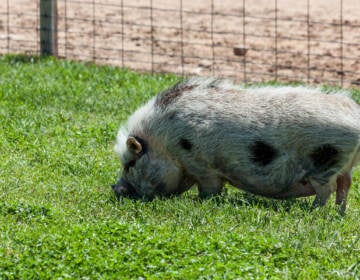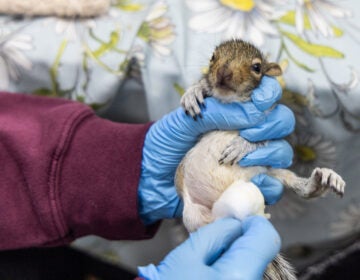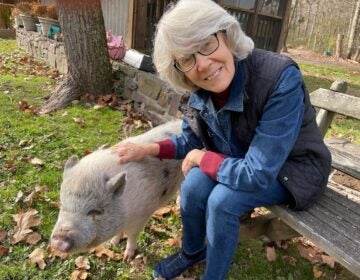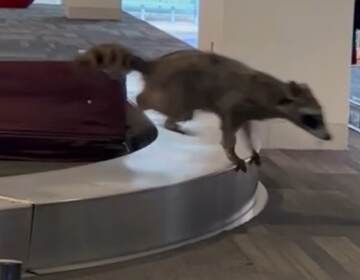Delaware bans potbellied pigs, but current owners can get permit to keep their pets — or else risk euthanasia
Under the new regulation, the state has the authority to “immediately” euthanize animals whose owners have not complied. Breeding is also forbidden.
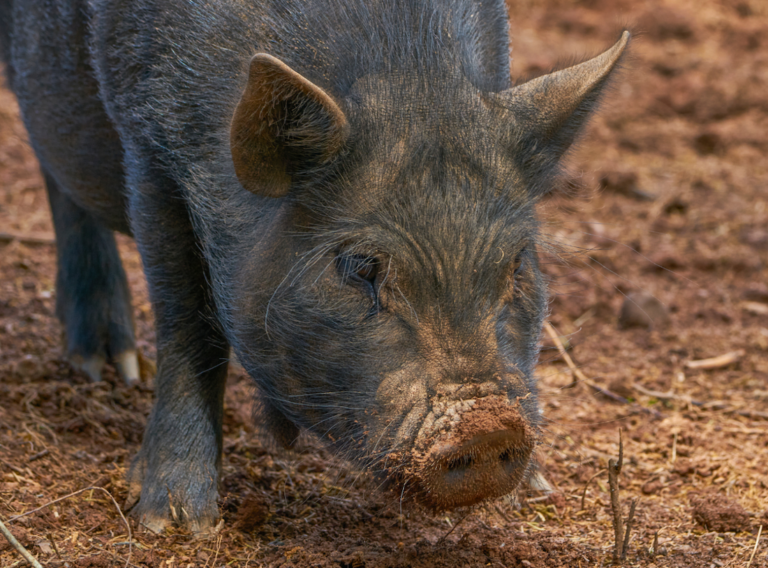
Delaware will no longer let people possess, breed or exhibit potbellied pigs but current owners can keep them if they qualify for a permit. (State of Delaware)
They’re trampling farm fields, grinding up yards, and gobbling up soybeans and even forest saplings in rural areas of western Sussex and Kent counties.
Some weigh more than 200 pounds, and they often roam wild in feral packs that risk spreading endemic diseases, such as salmonella and swine flu, to other animals and people.
They’re potbellied pigs, abandoned by owners who bought them as 35-pound pets that were sold as cuddly teacups, micros, or minis. But the animals have grown, perhaps had litters, and escaped or been turned loose by owners after they increased in size and lost their luster. They can live more than 20 years.
State veterinarian Dr. Karen Lopez of the state Department of Agriculture estimated this week there are up to 300 of them meandering around southern Delaware. She’s had to euthanize a dozen abandoned potbellied pigs in recent years.
Lopez has had enough, though.
Last fall her office issued a public warning, urging owners to call her department for guidance on securing or housing them, spaying or neutering, or animal identification.
But officials also began taking steps to declare potbellied pigs as Delaware’s only “invasive animal species” and enact a regulation to forbid people from having, breeding, selling, or exhibiting them.
The department’s new rule, which has the power of law and took effect June 1, does allow current owners to obtain a permit that allows them to keep potbellied pigs. The state is giving owners until August 12 to apply and comply with the new regulation.
The permit is free of charge and residents may apply for a permit online.
But after Aug. 12, no one can apply for a permit, or have a potbellied pig in Delaware without subjecting it to euthanasia if it’s discovered roaming around or gets reported to the state.
Delaware’s new rule is believed to be the only statewide one in the nation, according to Lopez and Susan Magidson of Bucks County, Pennsylvania, who runs the nationwide online Pig Placement Network.
Lopez says the new regulation and the punitive action it authorizes are necessary steps to protect property and deter the spread of disease.
“We all know that pets get loose,’’ she said. “We want to know if these animals are yours so that we can return them to you safely, because otherwise, they are so destructive, and a danger to our natural resources and a threat as far as livestock and human diseases, that we cannot have them on the landscape.”
‘Owners will just turn them loose to become stray’ animals
To obtain a permit, current owners must:
- Stop breeding their pigs
- Provide adequate housing and secure fencing
- Notify the state within 12 hours if a pig does escape
- Have separate housing for males and females capable of reproducing
- Allow Lopez or another state official to inspect the property to ensure compliance and examine the animals for possible disease
If owners qualify for a permit, the pig will be tagged with a visible form of identification.
Under the rule, if a pig is found at large without an ID tag and officials cannot find the owner to determine if they have a permit, a state or federal agent can kill the animal “immediately on-site.”
Lopez stressed that issuing permits to responsible owners — not euthanizing animals — is the state’s goal. To that end, she expressed delight that her office has already received permit applications for nearly 30 animals.
“We’re really happy for that and we’re going to start processing them,” the veterinarian said.
She doesn’t blame the pigs, or even naive owners who paid upwards of $3,500 for one pig for the situation that spurred the permit rule.
“They’re marketed as teacup pigs or micro mini pigs,’’ Lopez said. “And at that time, they are really cute and they make great pets. But as they get older, they may become more difficult to manage.
“People are not as interested in having them as pets, and because there are very few solutions for rehoming them, the owners will oftentimes just turn them out and loose to become stray or eventually potentially feral animals. And that’s not something that we can have going on in the state of Delaware.”
She said homeowners who have had potbellied pigs running around their properties or neighborhood have sent photos of the damage they have caused.
“If you can imagine what a rototiller will do in a garden, that’s basically what they will do to a backyard,’’ Lopez said. “Beyond that, they’ll move into a farmer’s fields of crops and eat their crops.“
Rescues are ‘inundated with unwanted pigs’
Magidson, who owns the Ross Mill Farms boarding center for pigs as well as the Pig Placement Network, applauded Delaware for trying to regulate the potbellied population and its owners.
If the pigs can reproduce and escape or get set loose, “they can reproduce rather quickly and they are good at being able to live on their own,’’ she said.
There are far too many potbellied pigs in the country than people who want to and can raise them as companion animals, Magidson said. Her network now lists more than 1,000 of the animals for whom a home is sought.
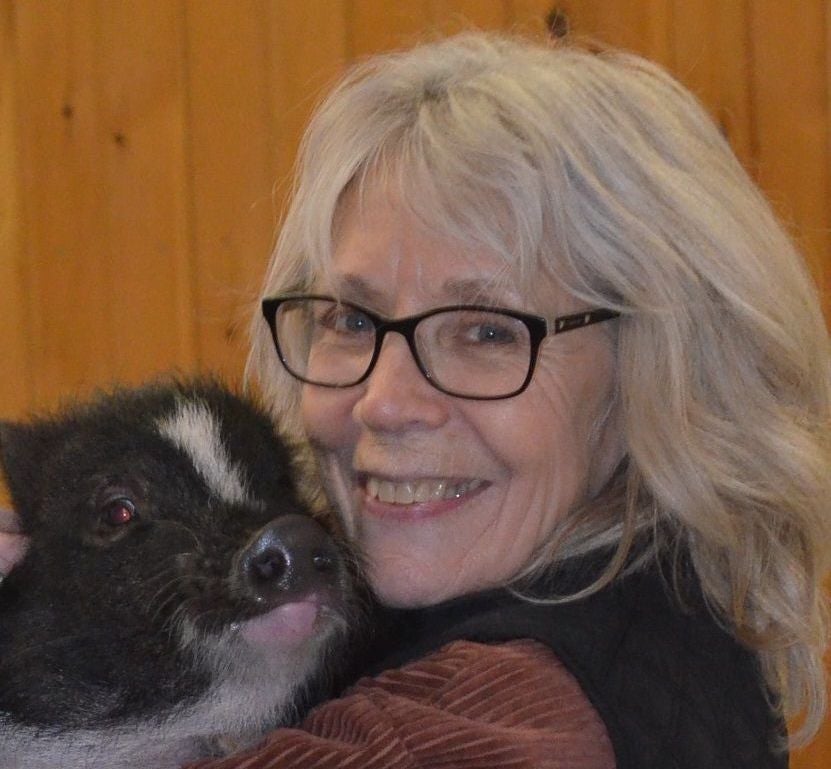
“The rescue world is inundated with unwanted pigs and groups of pigs, which we do our best to try to rehome,’’ Magidson said. “We discourage any breeding, even legitimate breeding.”
Magidson has one quibble with Delaware’s rule — that it requires permits for pigs that have been spayed or neutered.
“They would not be an invasive species if they were spayed or neutered because they can’t reproduce,’’ Magidson said. “So if I were writing this permit or regulation, I think that I would write it very differently to kind of protect the pigs that are not invasive.
“I understand that there are quite a large number of them in Delaware and that it is a problem. But I think that to penalize the hundreds of pig people who might be having a pig as a companion animal, that’s a little harsh.”
Lopez countered that even spayed or neutered pigs can spread disease and cause damage to property.
“Just because they are neutered doesn’t mean that they can not get out and cause a lot of destruction,” Lopez said, “as well as carry diseases that could be transmitted to our domestic swine populations and also carry diseases that could be transmitted to people.”

Get daily updates from WHYY News!
WHYY is your source for fact-based, in-depth journalism and information. As a nonprofit organization, we rely on financial support from readers like you. Please give today.



